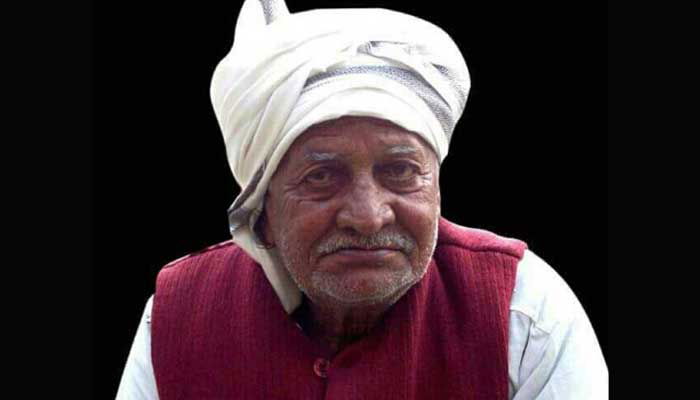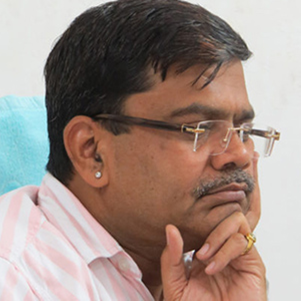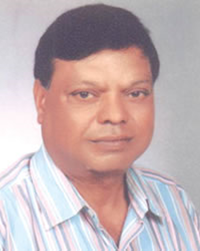The Dalit Question in Hindi Poetry: Adam Gondvi, Asang Ghosh, Surajpal Chauhan/ Ambrish/ Issue 02
Curated and translated from the Hindi by Ambrish
Editorial note: This is not an essay, but a work of curation. It contains a brief introduction of the poets, translations of seven poems from Hindi, a brief translator’s note, a couple of contextual notes on the poems, and references for further reading.
Adam Gondvi

Born as Ram Nath Singh, Adam Gondvi (22 October 1947 – 18 December 2011) was an Indian poet from Atta Paraspur, Gonda, Uttar Pradesh. He wrote poetry in Hindi, highlighting the plight of marginalized castes, Dalits, impoverished people. Born in a poor farmer family, however, they had considerable arable land. Gondvi's poetry was known for social commentary, its scathing view of corrupt politicians and for being revolutionary in nature.In 1998, Madhya Pradesh government awarded him with Dushyant Kumar Prize. In 2007 he was awarded Maati Ratan Samman by Shaheed Shodha Sansthan for his contributions to Awadhi/Hindi. Gondvi died on 18 December 2011 in Lucknow due to stomach ailments. His poetry collections Dharti Ki Satah Par (On the Surface of the Earth) and Samay Se Muthbhed (Encounter with Time) are quite popular. (Source: Wikipedia)
For You Life is a Blossoming Gulmohur
You’d say a season of blossoming gulmohur is this life,
But for us impoverished ones only an utter mayhem is this life.
In sweltering starvation wilts down the vine of dignity,
Bitter than the moment of death is the experience of this life.
On the branch that is religion unceasingly blossom the riots,
Yet under the shade of a dream, rests obliviously, this life.
A lifelong illicit affair with the dead corpse of the light,
Engaged in the false notion that a blazing star is this life.
That where the innocent love of the youth is buried,
The nasty consequence of those urban streets is this life.
Those Bereft of Any Mention in the Vedas
Who are not mentioned even in the margins of the Vedas,
What use for those wretched ones is faith and belief!
Where that murderer of Shambooka is joyfully celebrated,
Why value the disgusting history of such an order!
How regressive the history of those lived experiences,
What to do of the tragedies, frustrations, agony, suffocation!
A drought means something so different to the intellectual,
What do I make of their fetishization of dead stumps!
The scent of fresh warm bread itself makes me ecstatic,
What use then do I have of promises of ethereal love!
Note: Shambooka was a Shudra ascetic, mentioned in Valmiki Ramayana, who was beheaded by Rama as punishment for doing penance/ meditation, which a brahmin had claimed was the cause of his son’s death. Ambedkar in Annihilation of Caste mentions that such transgression (of a Shudra attempting to be a Brahmin) was a threat to the varna system and therefore, Rama killed him out of a sense of duty; since Rama-rajya was based on the ideals of varna system.
Come, Behold!
From body to soul, everything dissected, denuded– behold!
The mob enjoys the spectacle, inviting you to join in– behold!
The youth was to do away with the dark clouds cast over this bridge;
Instead, such despair looms over their face– behold!
The nation burns, while it cajoles her people,
How obscene are the words of that poetry– behold!
Yet another Matsyagandha is to fall prey to an ascetic’s lust,
As this mist thickens and spreads afar– behold!
Note: Matsyagandha, also known as Satyavati, was the daughter of a fisherman and used to row travellers across the bank of a river. On one such occasion, she was rowing an ascetic called Parashara across the river, when he expressed his desire to mate with her there and then. To hide their act, he created a veil of dense fog over the river, around them.
Asang Ghosh

Asang Ghosh is a representative Dalit voice in contemporary Hindi poetry. From a young child helping his father mend shoes as a family vocation, Asang Ghosh went on to complete his PhD. He eventually became a civil servant in Madhya Pradesh government and is presently working with All India Administrative Services. He has authored 8 books of poetry and has short stories published in multiple Hindi journals. Besides numerous Indian cities, he has also been invited to Sri Lanka, China, Egypt, and Bali to recite his poetry. He has won numerous awards, which include Madhya Pradesh Dalit Sahitya Akademi Award (2002), Srijangatha Samman (2013), Guru Ghasidas Samman (2016), and Bhawani Das Singh Award (2017). (Source: Bengaluru Poetry Festival)
Your God
That language,
in which your god speaks,
listens and perceives,
I neither wish to read it,
nor do I intend to learn it.
Upon speaking in that tongue,
my forefathers have
had their tongues pulled out;
Even today, my ears ring
with the deafening pain,
of molten lead poured, burning,
tearing through their eardrums.
I couldn't care less,
to explain to such a god,
the matters of my life;
And anyway,
my crude dialect,
he neither understood ever before,
nor would he ever in the future;
Let him be,
Immersed in himself.
Come, Sit With Me
you
come, sit here with me.
smoke some bidis
burn out your lungs
carry these loads
hammer those stones
and break some sweat
grab that hammer
hold this chisel
carve out rocks
sculpt idols of Khajuraho
locked in sexual postures
or
build a Taj Mahal
an icon of love
then, get your hands chopped off.
you
come, sit by my side.
smoke this chillum
take a deep drag
and then, together,
the two of us,
would get down to clean
the rotting sewers
the filthy drains
and
if the stench becomes too horrid,
well, just cover up your nose!
you
come, sit in my company.
have this liquor
made purely of mahua
then, dump your scriptures,
take off that janeu
and, with it,
stitch some hide.
come, join me,
in tanning leather.
you
come with me.
mend some shoes
be a Pasi
be Bhangi-Chuhara
be a Chamar.
although, in these tasks
how will your caste
accompany you?
Surajpal Chauhan

Surajpal Chauhan (born 20 April 1955, Phusawali, Aligarh, Uttar Pradesh) is a Dalit writer and publisher. His story, “Harry Kab Ayega”, 1999 is a well known work in Dalit literature. Besides, he has written an autobiography “Tiraskrit”, poetry collection “Prayaas”, and poetry for children. He is a recipient of the Hindi Academy Award and Ramakant Memorial Story Award, 2002. His works have been translated into English, German, Telugu, Marathi, Gujarati, Punjabi, and Urdu. (Source: Vani Prakashan)
In the Name of Artistry
Oh you –
relentless propagandists
of tradition;
Beating drums of
your high heritage;
Why do you stand
like a rock in my way,
obstructing my path?
In the name of aesthetics,
why do you
want to wipe off
the ink of my pen?
Since ever
you have claimed
my creation
as your own;
and have tricked me –
in the name of tradition,
and created
mere chatterbox of a literature
in the name of artistry!
The Actual Matter is This
It’s neither a matter of
Uttarakhand,
nor of Jharkhand;
the matter is not of
somebody’s defection
or of their religion, or faith.
It’s not about
the education and progress
of the dalits;
or, about them acing
the field of sports.
The matter is neither about
appointing one a priest
at some temple
nor is it about
getting the foundation laid
at the hands of a Shudra.
It's also not about
the grand games of Power,
or to reap its benefits either.
The matter really is,
about ‘Dalit Literature’.
What if the exploited people
of this country,
who,
since aeons,
are fast asleep
entranced in
mythological tales,
wake up
upon reading
the Real Literature!
The fear is –
the ‘chatterbox literature’,
written in cozy rooms,
would be laid exposed,
stripped bare.
Translator’s Note
All my translating attempts are not more than two months old, but each time I try to meditate over a word of the poem in original and try exploring multiple words to strike a right balance of meaning, I feel the joy of a creator. That is a paradox of translation, and perhaps that's why it has been called an art. And so there can't be, I believe, a set of rules that ought not to be broken for a work of translation to be a good one. It does begin with the dry work of careful analysis of the skeleton that is the words, phrases, structure of the poem; but that's only to eventually (with hope!) let the effect appear in another flesh.
The soul or the essence of a good poem remains elusive. Perhaps that’s why, translating good poetry, especially the ones which lie out of our existing sphere of experiences, like the Dalit-Bahujan work in case, was a great study for me. The process of translation becomes a mirror. It is precisely in one’s failed attempts to capture the essence and in the flaws (the gap between the translator's choice of phrase and the original) that one gets a glimpse of their style, vocabulary, and the ‘politics of language.’
Among the three poets here, Adam Gondvi was the most difficult to translate. Not just because his prose is with a distinct rhyme structure but also because of the layers of meaning within and between the lines. He presents to the reader the condition of suffering as it is; directing our attention to matters that we see regularly but do not really look at. The sense of taunt and satire in his writing pushes the reader towards an introspection. The brilliance of his writing immediately shows and helps us recognize his position against the hierarchy of the caste structure.
Asang Ghosh’s words fall upon the reader like a rain of arrows. In his direct and simple free-verse writing, one can sense the frustration and aggression of the people exploited under casteist suppression, and there is a preparedness, a will to now fight back. He attacks with vigour both the caste structure and the religious tradition (Hinduism) from which he sees it stemming out directly, and with vehemence he rejects the million gods that this country prays to.
Surajpal Chauhan’s free-verse is simple in its flow, without a trace of pretentious vagueness that we find often in romantic verses. His central theme is to bring to light the larger picture of untouchability, not merely in the physical sense, but also in its manifestations of psychological prejudices and the literary ‘merit’. His work challenges the persisting elitism of the savarnas that practices certain notions of aesthetics, power, and success in a manner that overlooks their own privilege and deep-rooted discrimination; unaware that it is precisely this attitude that exists as a cruel obstruction in their path of progress.
Translating a poem allows one to listen to the poet more intimately. It remains not only a matter of mere agreement or disagreement but, becomes of something more, that of compassion. I could only have a glimpse of such a life, that Gondvi describes as an experience bitter than the moment of death. Or ask myself, if I see the stark social divide, the hypocrisy of the elite, and its effect on everything, from education to arts, from knowledge-making to creative expression as clearly as Surajpal does when he calls almost the entire literature a mere chatterbox? Or, reading in our cozy homes this wonderful magazine, amidst the present chaos that has made people suffer discriminatingly according to their class, caste and social network, are we frustrated enough to curse ‘our God’ as Asang does? The answer, if I be honest, is no. For to read, to listen, or to even translate, is from a distance. And as Asang points it out, the only way for me then is to go and sit with him, live his life. But, as he leaves us in the end with the question, “will your caste accompany you in all this?”, one feels a sacred thread materialize across their torso. And we must remember that; the very reality of it.
References
The original Hindi poems of the poets can be read at Kavita Kosh website; here are the links:
http://kavitakosh.org/Adam Gondvi
http://kavitakosh.org/Asang Ghosh
http://kavitakosh.org/Surajpal Chauhan
Ambrish is a past student of science. He is currently jobless, living in Dehradun with his mother, and is trying his hands at creative writing. He spends most of his time in random reading and film watching. He currently feels that he wants to make films in the future.